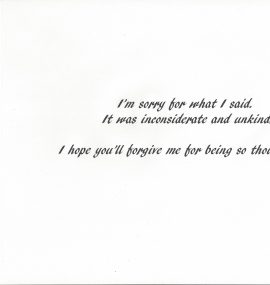Learn to Forgive
Fred Luskin is the Director and Co-founder of the Stanford University Forgiveness Project. His book, Forgive for Good, provides a readable and helpful account of how you can use forgiveness to get over long-term grievances that sap energy from your life. You can learn to forgive everyone for perceived slights that you experience. People who have learned to be more forgiving become less angry, less depressed, less anxious, more hopeful, and more confident. Every major spiritual tradition encourages forgiveness.
According to Luskin, forgiveness has several key characteristics, including taking responsibility for how you feel, taking back your power, getting control over your feelings, and improving your mental and physical heath. Forgiveness is a choice that you can make. Happily, forgiveness is learnable just like any other skill. Simply because bad things happen to you does not mean that you have to dwell on them. It’s also important to remember that dwelling on the past will not change it. But you can change how you regard the present.
Forgiveness researcher Charlotte vanOyen Witvliet commented in 2001 that, “Research on forgiveness is still in its early development.” That still seems to be the case today. Some evidence indicates that forgiveness is associated with better health, such as reduced risk of cardiovascular disease. However, few long-term prospective studies, in which a cohort of people is followed for an extended period of time, exist. I have yet to find any controlled experiments in which participants receive a forgiveness intervention or a control intervention and for which follow-up extends for months or years into the future. Nevertheless, it’s difficult to believe that being forgiving would not improve your personal well-being if not your health. Would you rather associate with a person who is forgiving or with a person who holds grudges?
Kelly McGonigal is a health psychologist at Stanford. In her book, The Willpower Instinct, she notes that forgiveness promotes accountability. People who take a self-compassionate view of personal failure are more likely to take personal responsibility compared to people who adopt a self-critical point of view. Self-compassionate people are more willing to accept feedback and advice from others and more likely to learn from experience.
My parents divorced in 1951 when I was five years old. In those days, divorce was practically unknown, except among movie stars. For decades, I harbored a grudge against my father, although I didn’t realize it. About 15 years ago, while participating in a PAIRS class, I wrote a lengthy forgiveness letter to my deceased father. I explained how sad I was as a child not to have a father in my life. While I didn’t approve of his leaving our family, I genuinely forgave him for what he did. To my astonishment, as I read the letter in class, my unexpressed sadness and resentment instantly evaporated, never to return. If you harbor a grudge against someone in your life, I suggest that you write a forgiveness letter. I predict you’ll be delighted with the results.








